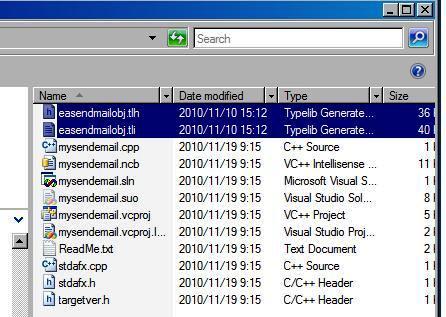Visual C++ - Validate email address syntax and test email address¶
The following c++ example codes demonstrate how to test email address without specified SMTP server.
Validate Email Address Syntax
Regular expression can be used to validate if an email address is in correct format.
For example: you can use this ^[A-Z0-9._%+-]+@[A-Z0-9.-]+\.[A-Z]{2,6}$
pattern to verify if the email address has valid format.
Test Email Address
Even the email address has a valid format, it doesn’t mean the email address is existed in real world. TestEmailAddr method can be used to test if the email address is valid.
How does it work? Firstly, SmtpClient performs a DNS MX record query. If it retrieves the recipient’s local SMTP server successfully, SmtpClient will try to connect to this server. SmtpClient then performs “RCPT TO” command to test if this SMTP server accepts this email address.
Please always pass zero-length string to ServerAddr property except you want to test whether an email address will be accepted by a specified SMTP server.
Sections:
Installation¶
EASendMail is a SMTP component which supports all operations of SMTP/ESMTP protocols (RFC 821, RFC 822, RFC 2554). Before you can use the following example codes, you should download the EASendMail Installer and install it on your machine at first.
Add reference¶
To use EASendMail SMTP ActiveX Object in your C++ project, the first step is “Add
header files of EASendMail to your project”. Please go to C:\Program Files\EASendMail\Include\tlh
or C:\Program Files (x86)\EASendMail\Include\tlh folder,
find easendmailobj.tlh and easendmailobj.tli, and then copy these
files to your project folder.

C++ - Test email address - example¶
The following example codes demonstrate testing email address using MX DNS lookup.
In order to run it correctly, please change SMTP server, user, password, sender, recipient value to yours.
Note
To get full sample projects, please download and install EASendMail on your machine.
#include "stdafx.h"
#include <tchar.h>
#include <Windows.h>
#include "EASendMailObj.tlh"
using namespace EASendMailObjLib;
const int ConnectNormal = 0;
const int ConnectSSLAuto = 1;
const int ConnectSTARTTLS = 2;
const int ConnectDirectSSL = 3;
const int ConnectTryTLS = 4;
int _tmain(int argc, _TCHAR* argv[])
{
::CoInitialize(NULL);
IMailPtr oSmtp = NULL;
oSmtp.CreateInstance(__uuidof(EASendMailObjLib::Mail));
oSmtp->LicenseCode = _T("TryIt");
// Set your sender email address
oSmtp->FromAddr = _T("test@emailarchitect.net");
// Add recipient email address
oSmtp->AddRecipientEx(_T("support@emailarchitect.net"), 0);
// Do not set SMTP server address
oSmtp->ServerAddr = _T("");
_tprintf(_T("Start to test email address...\r\n"));
if(oSmtp->TestEmailAddr() == 0)
{
_tprintf(_T("email was verified!\r\n"));
}
else
{
_tprintf(_T("failed to test email address with the following error: %s\r\n"),
(const TCHAR*)oSmtp->GetLastErrDescription());
}
return 0;
}
How does it work?¶
Firstly, SmtpClient performs a DNS MX record query. If it retrieves the recipient’s local SMTP server successfully, SmtpClient will try to connect to this server. SmtpClient then performs “RCPT TO” command to test if this SMTP server accepts this email address.
Why we don’t recommend testing email address?¶
Because it totally depends on your networking connection, if your networking connection to the recipient server is bad or your IP address is blocked by the recipient server, test will be failed, but it doesn’t mean this email address is invalid.
Moreover, to prevent email address testing, many email providers accept the recipient address at first no matter if the address is valid or invalid, only after you sent the email data to the server, then the server rejects it if the recipient address is invalid.
Recommended solution¶
Send the email to the recipient without testing. If you don’t get Transport Error and Failure Report in 24 hours, that means the recipient is valid. If you get Failure Report, you should consider to remove this recipient from your mail listing.
32bit/x64 ActiveX DLL¶
Seperate builds of run-time dll for 32 and x64 platform
| File | Platform |
| Installation Path\Lib\native\x86\EASendMailObj.dll | 32 bit |
| Installation Path\Lib\native\x64\EASendMailObj.dll | 64 bit |
Distribution¶
Standard EXE
For VB6, C++, Delphi or other standard exe application, you can distribute EASendMailObj.dll with your application to target machine without COM-registration and installer. To learn more detail, please have a look at Registration-free COM with Manifest File.
Script
For ASP, VBScript, VBA, MS SQL Stored Procedure, you need to install EASendMail on target machine by EASendMail installer, both 32bit/x64 DLL are installed and registered.
Appendix
- Send Email in Visual C++ - Tutorial
- EASendMail SMTP Component SDK
- Process Bounced Email (Non-Delivery Report) and Email Tracking
- Bulk Email Sender Guidelines
- Work with Email Queue
Comments
If you have any comments or questions about above example codes, please click here to add your comments.
